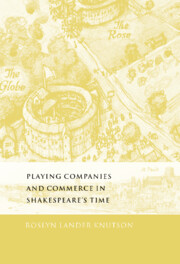Book contents
- Frontmatter
- Contents
- List of maps and tables
- Acknowledgements
- 1 Theatre history as personality
- 2 Players and company commerce
- 3 Playwrights, repertories, the book trade, and company commerce
- 4 Histrio-Mastix and company commerce
- 5 Hamlet and company commerce
- 6 Poetaster, Satiromastix, and company commerce
- 7 Conclusion: Hot Anger and company commerce
- Notes
- Bibliography
- Index
7 - Conclusion: Hot Anger and company commerce
Published online by Cambridge University Press: 22 September 2009
- Frontmatter
- Contents
- List of maps and tables
- Acknowledgements
- 1 Theatre history as personality
- 2 Players and company commerce
- 3 Playwrights, repertories, the book trade, and company commerce
- 4 Histrio-Mastix and company commerce
- 5 Hamlet and company commerce
- 6 Poetaster, Satiromastix, and company commerce
- 7 Conclusion: Hot Anger and company commerce
- Notes
- Bibliography
- Index
Summary
deare Captaine thinke
I writ out of hot bloud, which (now) being colde,
I could be pleas'd (to please you) to quaffe downe,
The poyson'd Inke, in which I dipt your name.
Horace, in Satiromastix, 4.2.65–68Among the lost documents that might illuminate the personality of Ben Jonson is “Hot Anger Soon Cold,” a playscript for which the Admiral's Men paid £6 to Jonson, Henry Porter, and Henry Chettle on 18 August 1598. Nothing more is known of the play, but it is hardly surprising that Jonson was drawn to a story about quarreling. Ian Donaldson argues “that anger meant a great deal to Jonson, both morally and creatively.” In discussions of theatre history, however, Jonson's anger has not been viewed so positively, nor has it been assumed to have grown cold. Apologists such as William Gifford, reacting at the turn of the nineteenth century to a deification of Shakespeare at Jonson's expense, believed that they had to justify Jonson's temper, and they did so by accusing others, specifically John Marston and Thomas Dekker, of being the provocateurs. Over time, these poets' quarrels acquired commercial significance. Poetaster and Satiromastix were taken to be proof of verbal attacks in other plays, and rivalries were assigned to the plays' company owners to match the intensity of the satirical pointing.
- Type
- Chapter
- Information
- Playing Companies and Commerce in Shakespeare's Time , pp. 147 - 149Publisher: Cambridge University PressPrint publication year: 2001



